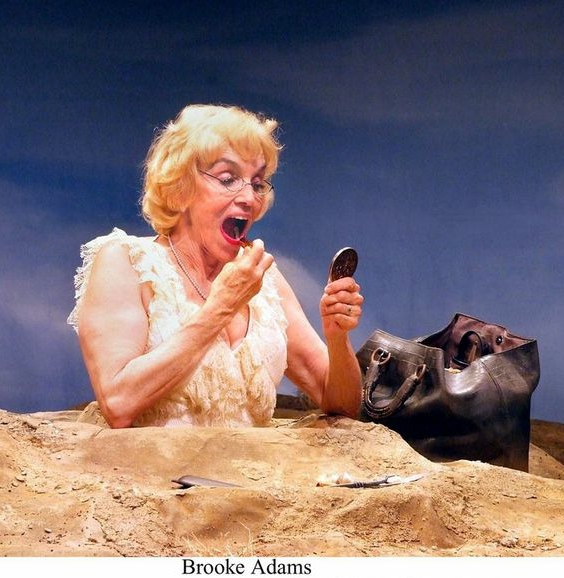When I read Samuel Beckett’s Waiting for Godot at the age of 25, I wondered what the play was all about. When I saw it decades later, I thought it was the most remarkable piece ever written for the theatre. My point: the older you are, the better you appreciate Beckett’s plays.
Beckett never was a playwright for all markets. The young tend to wonder what he’s writing about because they’re flush with the business of living and Beckett’s wry perspective comes from a mountain of age. Well, at the very least a small mound, as will be evident to anyone, young or old, attending Happy Days now at the Theatre @ Boston Court in Pasadena.
This seldom revived piece — like Godot, like all of Beckett — demands an act of dedication on the part of the actors who perform it. Its two solitary characters, Winnie and Willie, speak for us all. The setting (by Takeshi Kata) is as bleak as it can get: an arid mound of earth under a beating sun in which every living thing appears to have dried up, except for Winnie, a woman buried in earth up to her waist (deeper later), while a man, Willie, loiters behind the mound lost in silent thoughts and only an occasional utterance.
Jessica Tandy and Hume Cronyn performed this play together, as did French actors Madeleine Renaud and Jean-Louis Barrault. In each case the actors were married to each other. The production @ Boston Court also is performed by a married couple: Brooke Adams and Tony Shalhoub. This may seem like a trifling observation, but the intimacy of the offstage relationship has theatrical relevance. It helps to enhance the onstage chemistry.
The primary focus in this quasi-monologue is on Winnie, who talks more or less nonstop, while Willie says next to nothing in his own very eloquent way. Winnie speaks, she tells us, because the preternatural silence is too deafening. She focuses first on the big things, announcing at the start of her day, “No change. No pain. Wonderful thing that. Nothing like it,” followed at frequent intervals for a variety of reasons by a gratitude she’s intent on maintaining. “Great mercies, great mercies” is heard quite often.
In between, to make the minutes pass, she moves on to the minutiae of daily life: brushing her teeth, remembering (or forgetting) to comb her hair, rejoicing at the contents of her large purse (a gun included), postponing the singing of a song until “later,” because it will make the hour more special then. And always interrupting her own thoughts to try to get a reaction out of Willie because, as she makes clear, talking to yourself can get tiresome and even terrifying. “Words fail.” Sometimes.
Sometimes Willie responds; sometimes he doesn’t. But oh, when that answer comes, when even a grunt from the “other” is heard, Winnie exults, “This is going to be another happy day,” with a smile that could light up the sky if it weren’t already blazing.
What needs to be seen and heard in Andrei Belgrader’s nicely calibrated staging of this production is the subtlety and variety of Adams’ characterization of Winnie. The performance is delivered at a pace that never hurries but also never flags. She is by turns dignified, irritable, frightened, polite, determined to maintain composure at all cost. A fleeting expression of alarm (“I have not lost my reason. Not quite. Not yet.”) or flash of irritation aimed at Willie, when she needs him to respond and he won’t, speak volumes. These also could be aimed at whatever out there has brought the two of them to such an impasse. Mutual nuclear destruction? God? Man? Nature? Time?
Tony Shalhoub’s performance as Willie makes its own large contribution. His determined reluctance to react to the situation or to Winnie’s persistence is filled with terse gems of inarticulation, each of which supports Winnie’s interminable chatter, sometimes in touching ways, at other times in surprisingly funny ones.
These integrated characters are as indispensable to one another as they are to making the play work. And the performances delivered by the two actors remind us of why theatre will not die. Nothing that is so captivating on this stage, in this dark room shared with others, as we watch these two survivalists soldier on, would work for the camera. The play needs the pulse of life, the precious breath of live actors.
Beckett was prescient perhaps beyond his own imagining when he wrote Happy Days. With all the clamor about climate change roaring in the background, this piece takes on added meaning, although it doesn’t need it. As an African American mime said to me once, “From the moment we are born, we are fighting rigor mortis.” Happy Days is a requiem for that more personal climate change to come — the one that we each carry within us from birth.
WHAT: Happy Days
WHERE: Theatre @ Boston Court, 70 No. Mentor Ave., Pasadena, CA 91106
WHEN: Thursdays-Saturdays 8pm; Sundays 2pm. Through October 12
HOW: Tickets $34 (seniors $29), available at the Theatre @ Boston Court box office or at 626.683.6883 or online at BostonCourt.org
All photos by Ed Krieger

